Ukraine crisis: Civilians killed, dozens missing, as Russian missile hits Ukraine shopping mall
Horrifying footage has captured the moment a Russian missile obliterates a Ukrainian shopping mall, killing at least 20 civilians.
World
Don't miss out on the headlines from World. Followed categories will be added to My News.
At least 20 people were killed, with dozens still missing, after a Russian missile hit a shopping mall in the Ukrainian city of Kremenchuk.
Shocking footage shows the moment the missile struck, setting the building ablaze, as debris blasts through the air. Local fire chief Ivan Melekhovets told The Sun said nearby civilians had “no chance of surviving” a blaze of such intensity.
“The hardest thing is to see the corpses – adults, children,” he said.
Other footage captured terrified families cowering as the missile struck, and running for their lives.
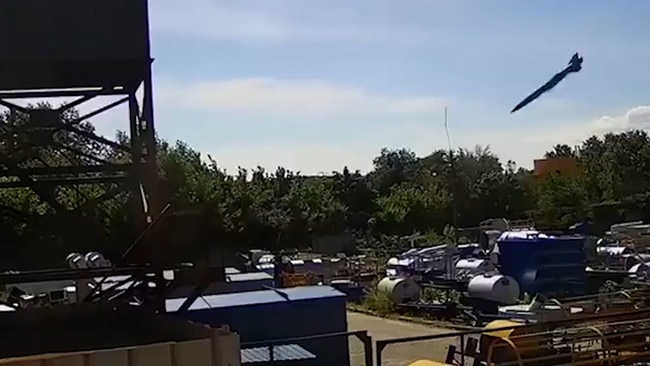
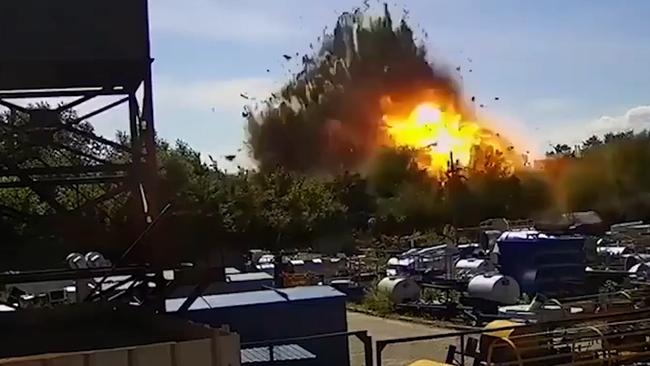
CCTV footage from a nearby shows terrified mothers and their children watching in horror as the blast blows debris into a pond. Others grab their belongings and flee.
As second strike then hits, the screen turns orange and a man throws himself into the pond for protection, while a woman runs for cover.
Children can also be seen running for their lives, with hands covering their ears to escape the noise.
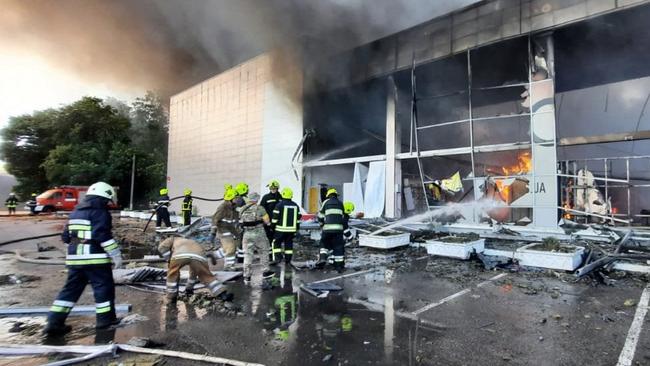
Russia denied blasting the shopping mall with missiles, and instead claims it struck a nearby depot of US and European arms, triggering an explosion which ignited the fire in the mall. Russia’s defence ministry said in a daily statement on the war: “In Kremenchuk, Russian forces struck a weapons depot storing arms received from the United States and Europe with high-precision air-based weapons.
“The detonation of stored ammunition for Western weapons caused a fire in a non-functioning shopping centre located next to the depot.”
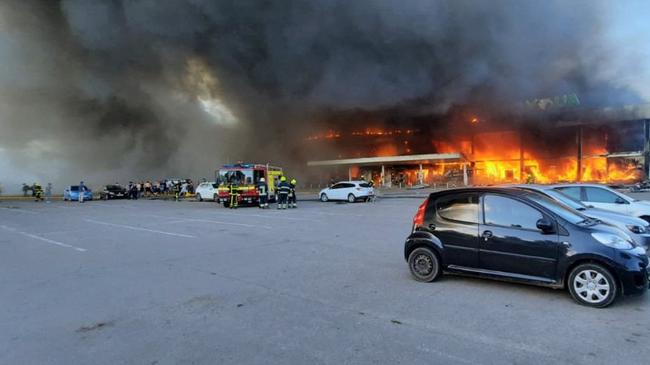
Maksym Musienko was working in an electronics store as the missile hit, resulting in shrapnel wounds and a concussion. The 26-year-old told The Sun there were about 100 customers in the shop at the time.
“We were working. There were a lot of people in the shop, but I don’t remember anything after that,” he said.
“The shopping centre is not a place of danger for the Russians. We thought we were far away from the frontier.”
Ukraine’s president, Volodymyr Zelenskyy called the attack “one of the most daring terrorist attacks in European history”.
More than 1000 people were inside at the time of the attack, he said.
‘COMPENSATORY MEASURES’
NATO announced a massive military build-up in Europe after formally inviting Sweden and Finland as candidates to the alliance.
Russia reacted with threats of “compensatory measures” after the US and its European allies ordered the large-scale deployment of new troops, ships and planes to the region.
NATO chief Jens Stoltenberg said they could not discount a Russian attack on European soil, adding that Moscow’s “appalling cruelty has caused immense human suffering and massive displacements, disproportionately affecting women and children”.
As part of the build-up, the US will shift the headquarters of its 5th Army Corps to Poland.
An army brigade will rotate in and out of Romania, two squadrons of F-35 fighters will deploy to Britain, US air defence systems will be sent to Germany and Italy and the fleet of US navy destroyers in Spain will grow from four to six.
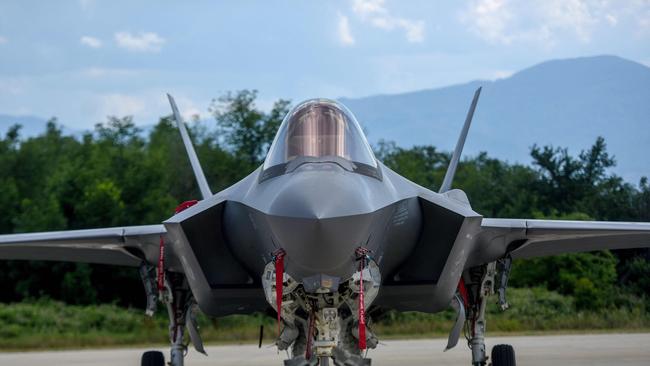
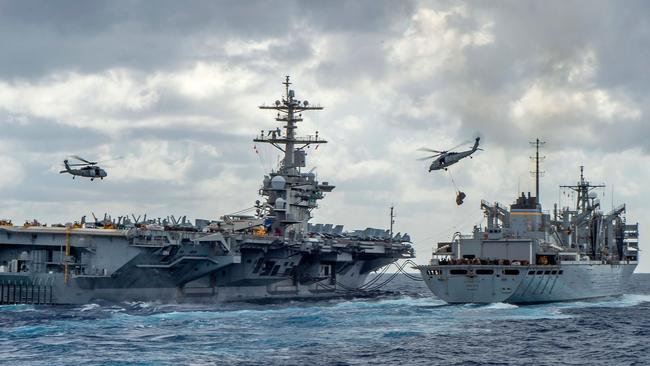
Norway would donate three multiple-launch rocket systems to Ukraine, following similar decisions made by Britain, Germany and the United States.
“That’s exactly what he didn’t want but exactly what needs to be done to guarantee security for Europe,” US president Joe Biden said.
Sweden and Finland’s path to NATO membership was opened after Turkey’s President Recep Tayyip Erdogan agreed to lift his threat of a veto over wanted Kurdish militants in the two countries.
The US also signalled its support for Turkey’s plan to upgrade its air force with new, American-made F-16 warplanes.
The parliaments of all 30 NATO members, including Turkey, must ratify Finland’s and Sweden’s membership bids before they can become full members.
Russia’s Foreign Minister Sergei Ryabkov denounced the US military build-up, and warned NATO members that the shifting balance of power “would lead to compensatory measures on our part”.
“I think that those who propose such solutions are under the illusion that they will be able to intimidate Russia, somehow restrain it — they will not succeed,” he said.
BREAKTHROUGH IN SWEDEN, FINLAND NATO BID
Turkey has lifted its objection veto over Finland and Sweden’s bid to join NATO after the three nations agreed to protect each other’s security, following weeks of tense talks.
The breakthrough between the leaders came on Tuesday local time after four hours of talks just before a NATO summit began in Madrid.
NATO Secretary-General Jens Stoltenberg and Turkey’s presidency confirmed the move in separate statements, after talks between the NATO chief, Turkish President Recep Tayyip Erdogan, Swedish Prime Minister Magdalena Andersson, and Finnish President Sauli Niinisto.
“I am pleased to announce we now have an agreement that paves the way for Finland and Sweden to join NATO,” Mr Stoltenberg said.
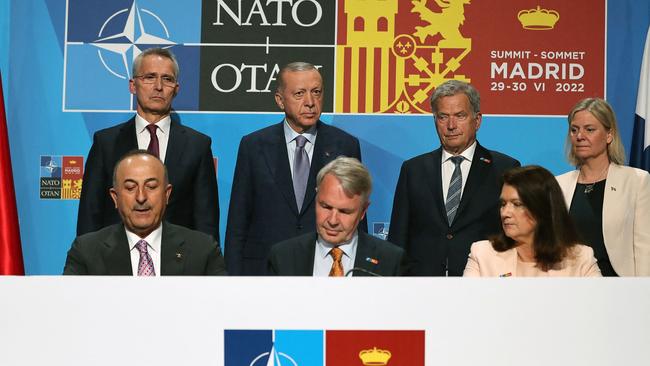
“Turkey, Finland and Sweden have signed a memorandum that addresses Turkey’s concerns, including around arms exports and the fight against terrorism.”
Sweden’s prime minister hailed the “very good agreement” with Turkey to back Swedish and Finnish membership in NATO and said the move would make the alliance stronger.
“Taking the next step toward a full NATO membership is of course important for Sweden and Finland. But it’s also a very important step for NATO, because our countries will be security providers within NATO,” Mrs Andersson told AFP.
Mrs Andersson rejected claims that she had conceded too much to Turkish President Mr Erdogan in order to convince him to drop his veto to Stockholm’s membership.
She insisted that Swedish authorities were working on extradition requests from Turkey in accordance with Swedish legislation and a European convention on extradition.
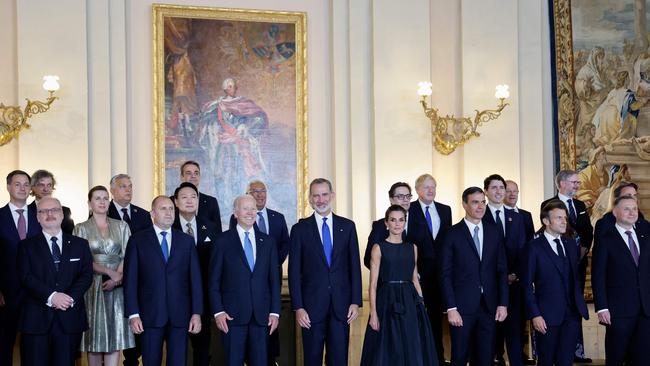
“I think this is an agreement that I can stand fully behind. And of course, we will continue our fight against terrorism and as NATO members also do so with closer co-operation with Turkey,” she said.
“Thirty countries have to sign the accession of course and all 30 parliaments and you never know what’s going to happen,”
“But I also know that the member states in NATO see the fact that Sweden and Finland both increase the security for NATO as a whole if we were to become members.”
The United States said no concessions were given to Turkey to secure its green light for Swedish and Finnish entry into NATO.
“Nothing about Turkish requests to the United States was part of this agreement. This is an agreement strictly among the three countries — Turkey, Finland, Sweden,” a senior administration official told reporters.
“The United States is not a part of it.”
Details will be worked out over then next could of days but the deal comes as Europe faces its worst security crisis in decades in the wake of Russia‘s invasion of Ukraine.
The major deal comes as UK General Sir Patrick Sanders warned the country is facing a “1937 moment” and must prepare for the worst to fight the “brutal aggression” of Russian President Vladimir Putin.
“In all my years in uniform, I haven’t known such a clear threat to the principles of sovereignty and democracy, and the freedom to live without fear of violence, as the brutal aggression of president Putin and his expansionist ambitions,” he is expected to say.
“This is our 1937 moment. We are not at war – but must act rapidly so that we aren’t drawn into one through a failure to contain territorial expansion.
“I will do everything in my power to ensure that the British Army plays its part in averting war.”
AUSTRALIA VOWS TO ‘STAND UP TO PUTIN’
Prime Minister Anthony Albanese has vowed to stand up to Russian President Vladimir Putin and hold the leader to account for war crimes, after a missile strike killed 18 people.
Mr Albanese, who is in Madrid for NATO talks, joined world leaders in condemning Russia’s missile strike on a crowded Ukrainian shopping centre on Monday.
He said the atrocities against Ukraine have united the democratic world against Mr Putin’s regimen as NATO boosted its defence troops to more than 300,000.
“We have no alternative but to stand up against Vladimir Putin’s aggression,” Mr Albanese said on Tuesday local time.
“If Putin is allowed to proceed in a way in which nation states say ‘this is too difficult’ and not provide and not provide the support that has been provided to the people and democratically elected government of Ukraine, then it’s not just a matter of the message that are sent, the economic consequence down the track are for nation states, no matter where they are in the globe.”
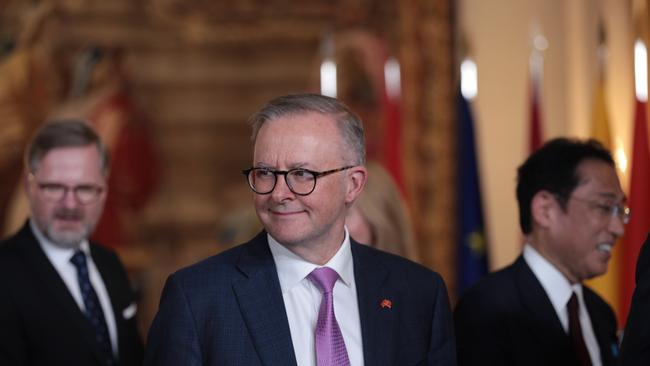
Mr Albanese also revealed Australia is one of several Western nations looking to reopen its embassy in Kyiv.
The Australian embassy in the Ukrainian capital was shut down by the former Prime Minister Scott Morrison shortly before Russia‘s invasion in February.
“We would like to have a presence on the ground there to assist and to be able to provide that on-ground presence, and I’ll have more to say on that in coming days and weeks,” he said.
“We would like to have a presence on the ground there to assist and be able to provide that on-ground presence.”
‘REAL DANGER’ AS RUSSIAN HACKERS LAUNCH CYBERATTACK ON NATO
The UK’s Defence Secretary Ben Wallace warned there’s a “very real danger” Vladimir Putin could “lash out” beyond Ukraine and strike the rest of Europe.
The dire prediction comes amid reports of a Russian cyberattack on NATO member Lithuania after the country cut off supply lines to Kaliningrad, where nuclear capable missiles are reportedly positioned 80 km from the Polish border.
Mr Wallace told a news conference that Russia is “the most direct and pressing threat to Europe”.
“I am serious when I say there is a very real danger Russia will lash out against wider Europe. In these days of long-range missiles and stealth – distance is no protection,” he said.
“The threat is growing, is global and multi-domain. It is now time to signal that the peace dividend is over and investment needs to continue to grow before it becomes too late to address the resurgent threat and the lessons learned in Ukraine. It is time to mobilise, be ready and be relevant.”
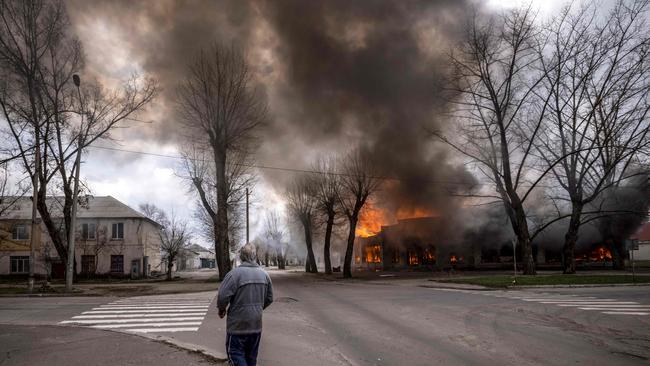
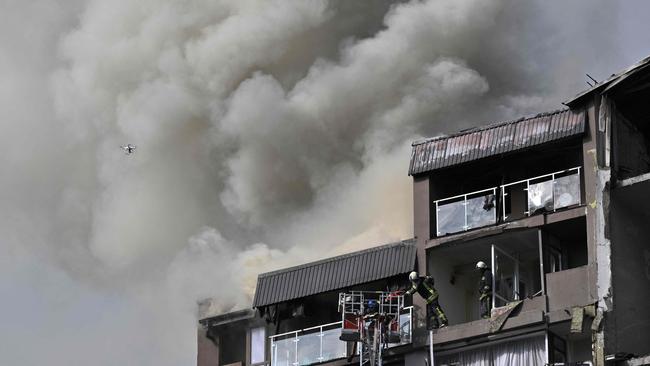
The move to mobilise NATO comes after a Russian hacker group, Killnet, claimed responsibility for a cyber attack on Lithuania in retaliation for the country blocking the transit of goods between Russia and its exclave, Kaliningrad, on the Baltic coast.
The Russian territory is separated from the mainland by Poland and Lithuania, which says it is enforcing European Union sanctions by blocking transit between Russia and Kaliningrad.
Kaliningrad is home to nuclear-capable missiles just 80 kilometres from the border with Poland, according to the Russian state news agency RIA Novosti, which reported that the Iskander missiles were deployed to the region in 2018.
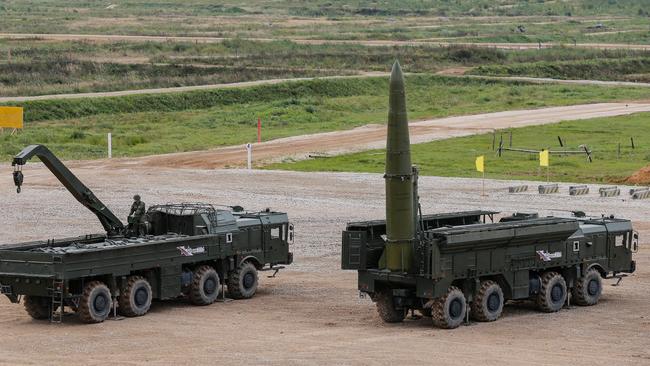
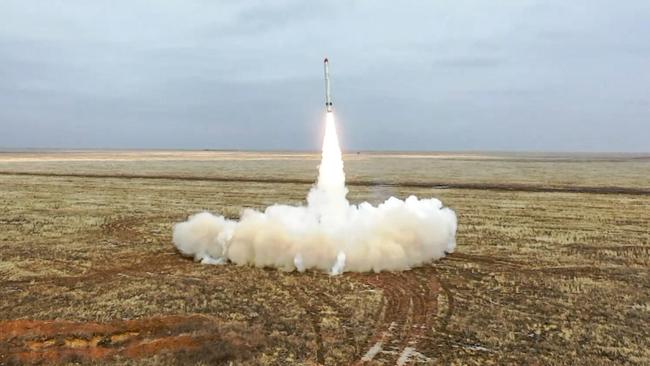
A physical attack on Lithuania or Poland would trigger the automatic defence treaty of NATO, drawing the US, the UK and Europe into a broader conflict.
NATO’s chief Jens Stoltenberg said the alliance will boost high readiness forces to “well over 300,000” troops as they strengthen their defences.
Stoltenberg said allies would bolster some of their battle group formations along NATO’s eastern flank “up to brigade level” — tactical units of around 3,000-5,000 troops — and ratchet up high readiness numbers to “well over 300,000”.
In addition, more heavy weaponry including air defence systems would be shifted forwards and forces pre-assigned to defend specific NATO members on the alliance’s exposed eastern edge.
“This constitutes the biggest overhaul of our collective defence and deterrence since the Cold War,” Stoltenberg said.
NATO currently has a high readiness force of around 40,000 troops under its command, but the more than 300,000 troops are expected to form a larger pool that the alliance could tap into in the case of an emergency.
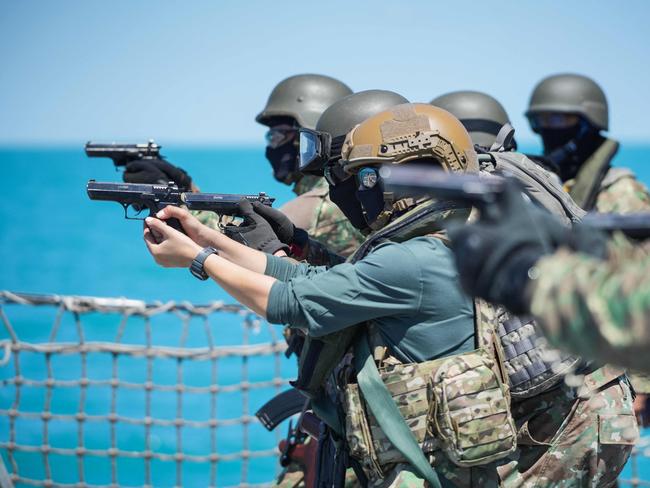
A NATO official said the new system would be in place next year and improve the alliance’s “ability to respond at very short notice for any contingency” with land, sea, air and cyber assets.
That package would include “substantial deliveries” of gear like secure communications, anti-drone systems and fuel, and help Ukraine over the longer term to pivot to using more advanced NATO-standard arms.
Germany has said it would take the lead on a new brigade in Lithuania — where it already has forces — but most of those troops would be permanently stationed back on home soil.
Britain’s defence Minister has said his country will likely propose a similar set-up for Estonia — where it commands the existing battle group.
Stoltenberg said he expected other allies to announce forces dedicated to protecting specific eastern members at the G7 summit.
‘WE ARE ALIVE’: MOMENT PEOPLE ESCAPE MALL HIT BY MISSILE
A Russian missile strike hit a crowded mall in the eastern Ukrainian city of Kremenchuk on Monday local time.
The death toll from the strike has risen to 16 but that’s expected to climb as rescuers clear the rubble, according to Dmytro Lunin, head of the administration of Poltava.
Dramatic footage shows people running out of the ruins of the centre shortly after it was hit by a missile.
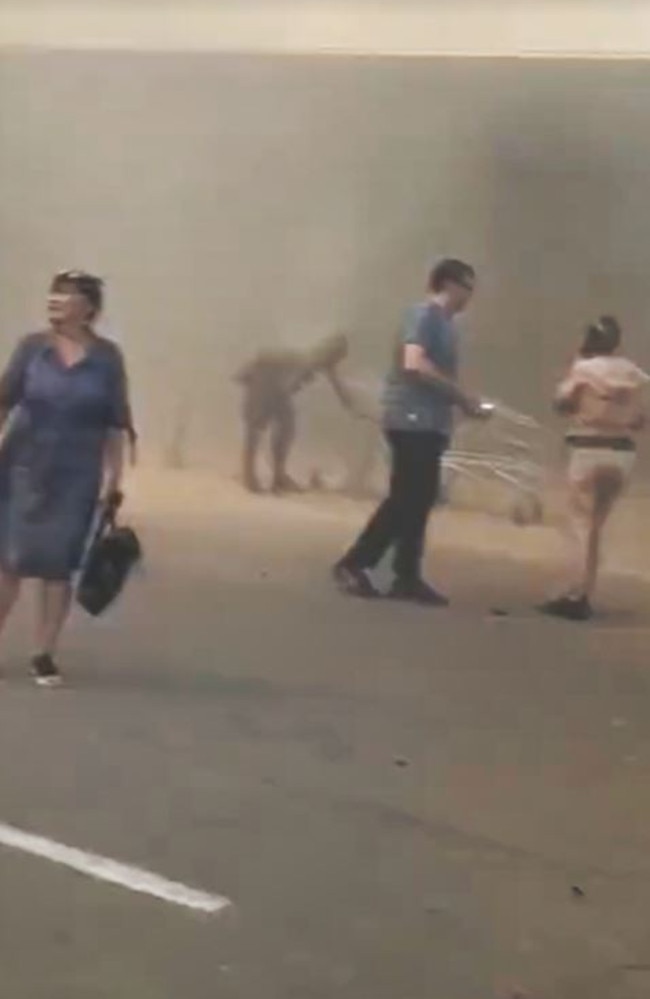
The Ukrainian defence ministry said the strike was deliberately timed to coincide with the mall’s busiest hours and cause the maximum number of victims.
The Ukrainian air force said the mall was hit by Kh-22 anti-ship missiles fired from Tu-22 bombers from the region of Kursk in western Russia.
“The missile fire on Kremenchuk struck a very busy area which had no link to the hostilities,” the city’s mayor Vitali Maletsky wrote on Facebook.
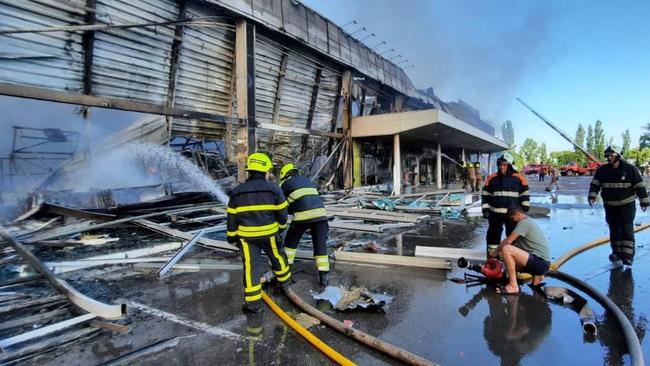
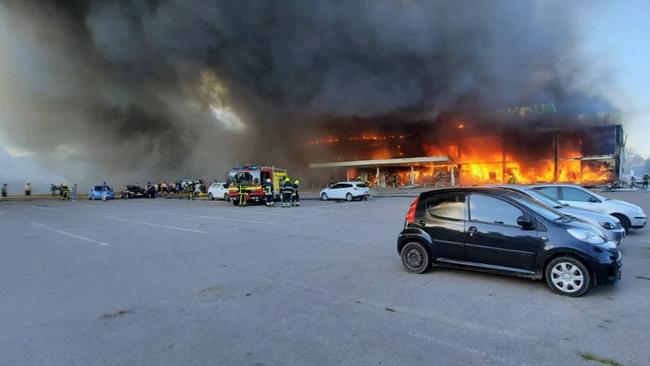
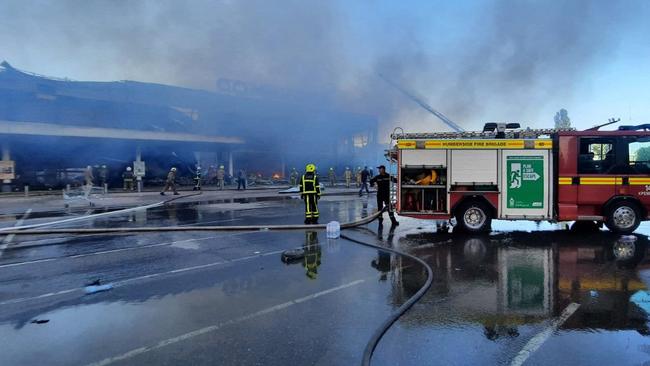
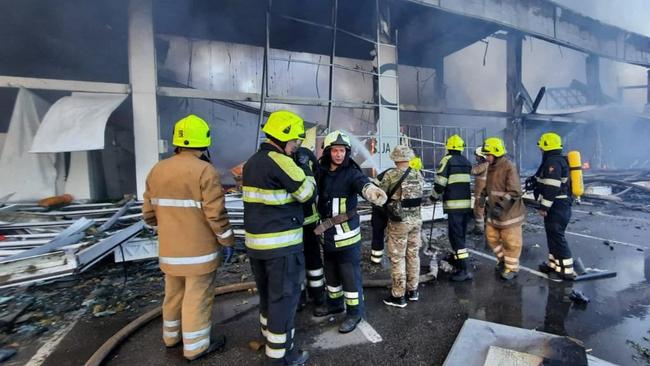
Ukraine’s President Volodymyr Zelenskyy said Russia fired on a shopping centre “where there were over a thousand civilians”.
“The mall is on fire, rescuers are fighting the fire. The number of victims is impossible to imagine,” Mr Zelenskyy wrote on Telegram.
A video shared by Mr Zelenskyy showed the mall engulfed in flames with dozens of rescuers and a fire truck outside.
He later declared: “The Russian strike today on the shopping centre in Kremenchuk is one of the most brazen terrorist acts in European history.”
The Ukrainian president’s deputy chief of staff, Kyrylo Tymoshenko, said on Telegram that there were more injured in a “serious condition”.
“The rescue operation continues,” Mr Tymoshenko added.
Poltava region governor Dmytro Lunin denounced the attack as a “war crime” and “crime against humanity”, saying it was a “cynical act of terror against the civilian population”.
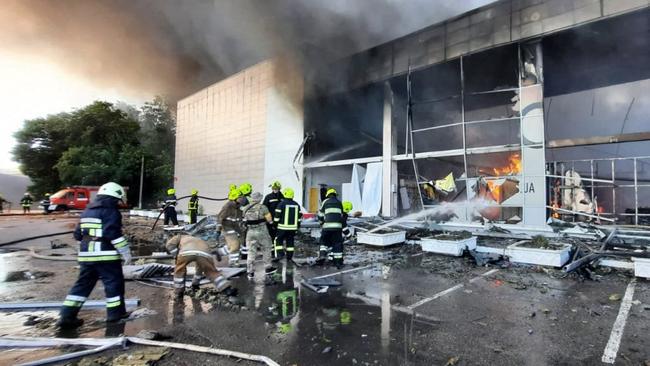
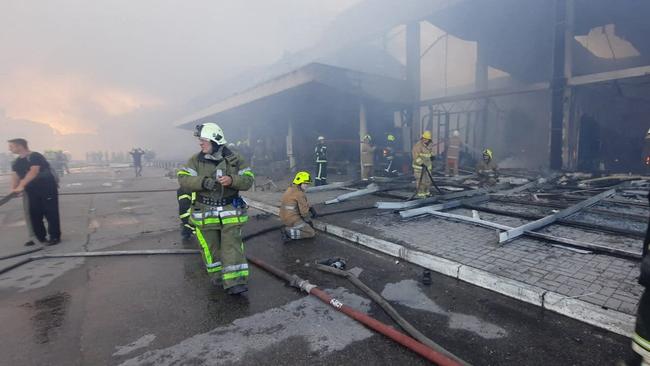
GROWING INTERNATIONAL OUTRAGE
US Secretary of State Antony Blinken said, on Twitter, that “the world is horrified by Russia’s missile strike today, which hit a crowded Ukrainian shopping mall – the latest in a string of atrocities”.
UK Prime Minister Boris Johnson said the attack demonstrates the “depths of cruelty and barbarism” of Russian leader Vladimir Putin.
“Putin must realise that his behaviour will do nothing but strengthen the resolve that the UK and every other G7 country stand by the Ukraine for as long as it takes,” he said
French President Emmanuel Macron wrote on Twitter in English.
“We share the pain of the victims’ families, and the anger in the face of such an atrocity. The Russian people have to see the truth.”
Below the tweet video footage of the blazing shopping centre, black smoke pouring off it, was posted.
Ukrainian Foreign Minister Dmytro Kuleba called on Kyiv’s allies to supply more heavy weapons and impose fresh sanctions on Russia.
“Russia is a disgrace to humanity and it must face consequences,” he wrote on Twitter.
Presidential aide Mykhaylo Podolyak accused Russia of being a “terrorist state”. There was also growing international outrage at the attack.
A statement from the G7 leaders gathered for a summit in Germany condemned the missile strike as a “war crime”.
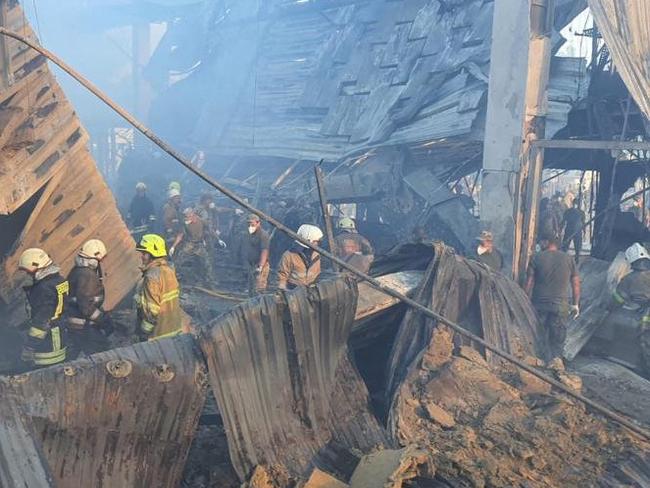
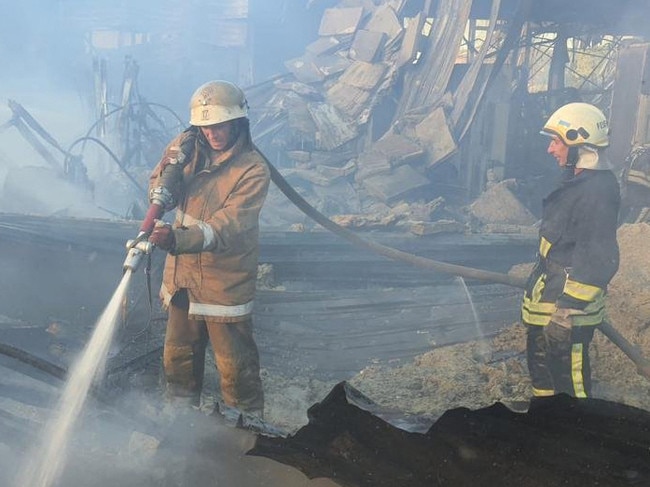
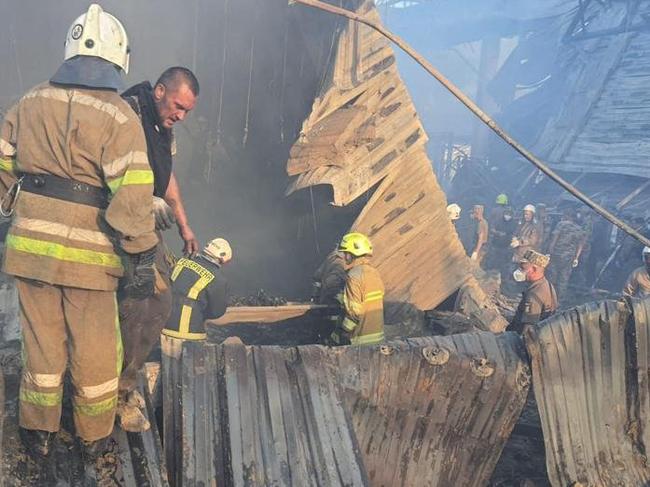
NATO TO BOOST HIGH READINES FORCES TO 300,000
NATO allies will boost high readiness forces to “well over 300,000” troops as they strengthen their defences in response to Russia’s war on Ukraine, alliance chief Jens Stoltenberg said.
Leaders from the US-led military alliance will meet in Madrid this week for what Stoltenberg said would be a “transformative” summit as it grapples with the fallout of Moscow’s invasion of its pro-Western neighbour.
Stoltenberg said allies would bolster some of their battle group formations along NATO’s eastern flank “up to brigade level” – tactical units of around 3000-5000 troops – and ratchet up high readiness numbers to “well over 300,000”.
In addition, more heavy weaponry including air defence systems would be shifted forwards and forces pre-assigned to defend specific NATO members on the alliance’s exposed eastern edge.
“This constitutes the biggest overhaul of our collective defence and deterrence since the Cold War,” Stoltenberg said.
NATO currently has a high readiness force of around 40,000 troops under its command, but the more than 300,000 troops are expected to form a larger pool that the alliance could tap into in the case of an emergency.
A NATO official said the new system would be in place next year and improve the alliance’s “ability to respond at very short notice for any contingency” with land, sea, air and cyber assets.
Stoltenberg also said leaders would agree to bolster NATO’s essential support to embattled Ukraine, whose President Volodymyr Zelenskyy is set to call in via video link.
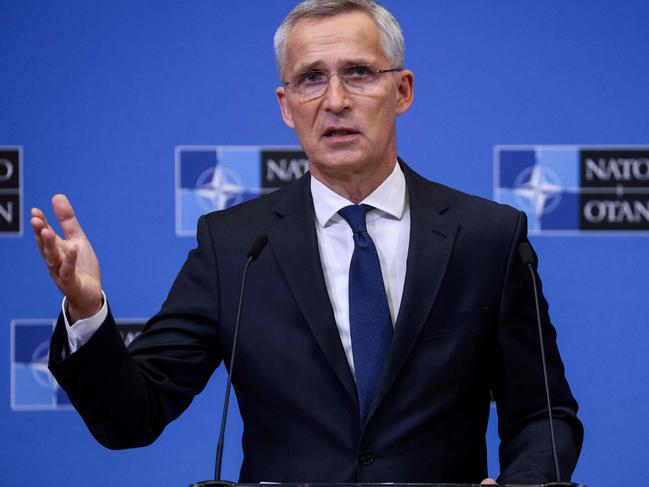
‘GRAVELY ILL’ PUTIN HAS TWO YEARS TO LIVE: SPY CHIEF
Ukraine’s top spy says Vladimir Putin has less that two years to live due to a “grave” illness.
In a rare interview, intelligence chief, Major General Kyrylo O. Budanov claimed that Putin
“doesn’t have a long life ahead of him”.
Mr Budanov told USA Today that the prediction was based on “human intelligence” of spies who had infiltrated the Kremlin.
While he didn’t name the illnesses, he has previously claimed in May that Putin with cancer and other ailments.
He told Sky News that Putin was in “very bad psychological and physical condition and he is very sick.”
It came after classified US reports said that the Russian president appeared to have had treatment for advanced cancer in April, according to Newsweek.
The Kremlin insists that Putin is in good health, but speculation continues over his bloated appearance.
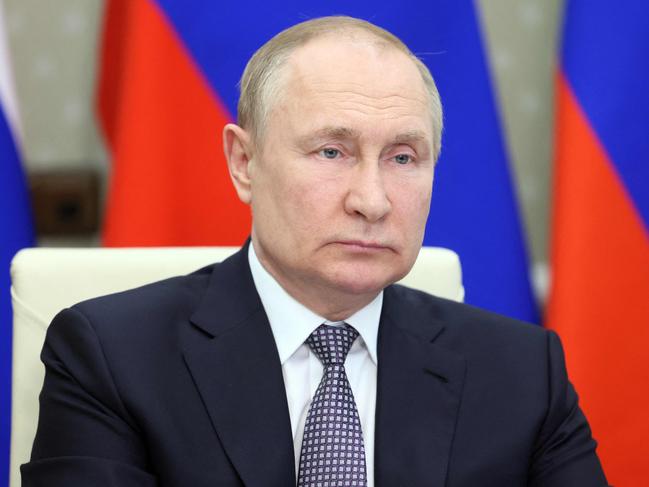
AUSTRALIA’S UKRAINE SUPPORT A WARNING TO CHINA: PM
The world is standing in “solidarity” with Ukraine against Russia will send a strong message to China about its own “forward leaning” actions, Anthony Albanese has declared.
The Prime Minister arrived in Madrid overnight ahead of two days of meetings with world leaders as he attends the NATO Summit as part of the “Asia Pacific Four,” which also includes New Zealand, South Korea and Japan.
Mr Albanese said the Summit was “an important meeting at a critical time for the world”.
“The Russian invasion of Ukraine has broken international law,” he said.
“What we know is that this brutal invasion is having real consequences for the people of Ukraine.
“And the people of Ukraine are inspiring the world with struggling to defend their national sovereignty.”
Mr Albanese said the invasion was also having an impact beyond Ukraine, including in Australia, where petrol prices are soaring and supply chains have been disrupted as a result of the war.
The Prime Minister said the widespread support for Ukraine was a lesson for not just Russia, which has “failed” in its attempt to quickly takeover the Eastern European nation, but also for China.
“The Russian invasion of Ukraine of course came in just after … a special relationship between Russia and China (was signed),” he said.
“That reinforces the need for us to be engaged, and I’m very pleased to be here, representing Australia at this NATO Summit.”
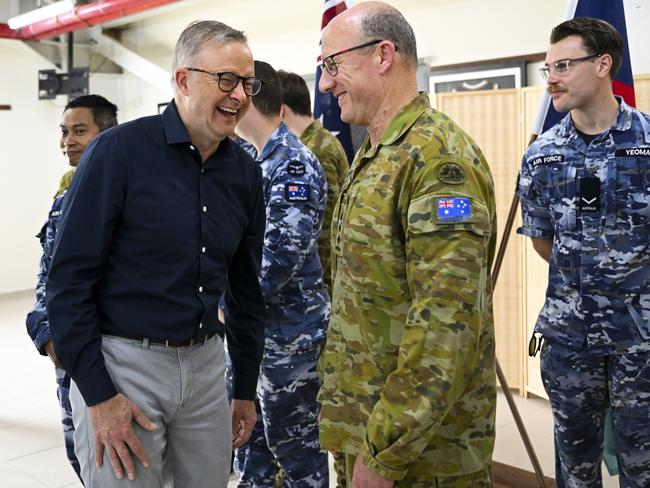
UKRAINE MISSILE SUPPORT A ‘PRIORITY’ FOR US
The United States is planning to send Ukraine sophisticated anti-aircraft missiles to defend against Russian attacks, a source familiar with the process told AFP on Monday.
President Joe Biden, who is attending the G7 summit in Germany, “has made the procurement of advanced air defence systems for Ukraine a priority”, the source said, asking not to be identified.
An announcement is “likely this week” on the purchase of NASAMS, an “advanced medium- to long-range surface-to-air missile defence system”, as well as other weaponry to help Ukraine fight Russia’s invasion.
This will include “additional artillery ammunition and counter-battery radars”, which are used to pinpoint the source of enemy artillery firing.
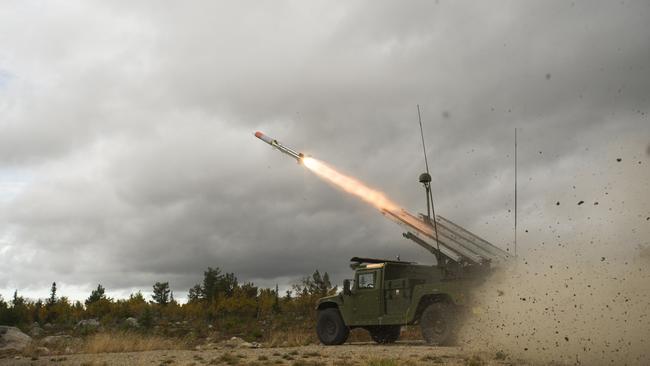
Ukrainian President Volodymyr Zelenskyy, who addressed G7 leaders by video-link on Monday, has pleaded for more powerful defences against Russian air attacks since the start of the invasion in February.
With Russian aircraft and cruise missiles bombing Ukrainian troops and residential areas daily, Zelensky initially focused on his rallying cry of “close the skies” with a request for Western countries to send war planes to Ukraine.
After the United States and European allies made clear that sending planes was too risky, potentially drawing them directly into the conflict against Russia, focus pivoted to surface-to-air missiles.
Ukraine has a variety of these weapons, including the powerful Soviet-designed S-300 system.
The NASAMS, built by Raytheon in the United States in partnership with Norway’s Kongsberg Defence and Aerospace, has been sold in 12 countries, according to the company website.
Ukrainian President Zelenskyy also urged world leaders gathered at the G7 summit to do their utmost to end Russia’s invasion of his country by the end of the year, a source told AFP.
In his closed-door address via video-link, President Zelenskyy said battle conditions would make it tougher for his troops as they mount their fightback.
A war pushing past winter also risked raging further beyond, he said. He therefore urged the G7 leaders to do their maximum to end the war by year’s end, including by intensifying sanctions against Russia, the source said.
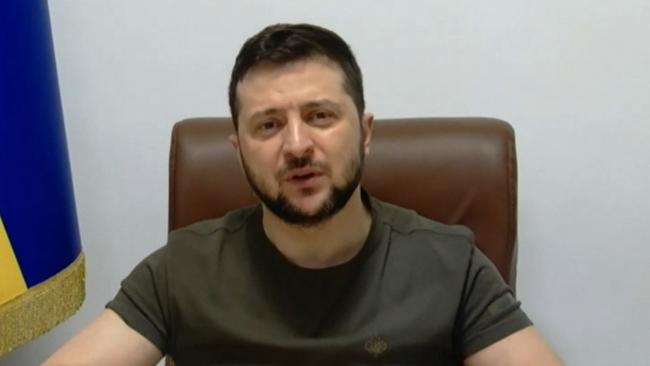
Despite the multiple rounds of punitive measures that Western allies have unleashed on Moscow, President Zelenskyy pleaded with them to “not lower the pressure and to keep sanctioning Russia massively and heavily”
The Group of Seven rich nations vowed enduring support for Ukraine in the face of Russian aggression, in a statement from its summit in Germany on Monday.
“We will continue to provide financial, humanitarian, military and diplomatic support and stand with Ukraine for as long as it takes,” the G7 said
It comes after President Zelensky told G7 leaders that the time has not yet come to open negotiations with Russia, as Kyiv is still seeking to consolidate its positions, the French presidency said Monday.
“President Zelensky gave a very clear response that now is not the time for negotiations. Ukraine will negotiate when it is in a position to do so, that is, when it has basically re-established a position of strength,” the French presidency said after the Ukrainian leader joined the G7 summit via video-link.
TOPLESS PUTIN THE BUTT OF JOKES AT G7
World leaders mocked Russian President Vladimir Putin’s tough-man image at a G7 lunch in Germany, joking about whether they should strip down to shirtsleeves – or even less.
“Jackets on? Jackets off? Do we take our coats off?” British Prime Minister Boris Johnson asked as he sat down at the table in Bavaria’s picturesque Elmau Castle, where Chancellor Olaf Scholz was hosting the summit of seven powerful democracies.
The leaders – from Britain, Canada, France, Germany, Italy, Japan, the United States and the European Union – pondered the dilemma.
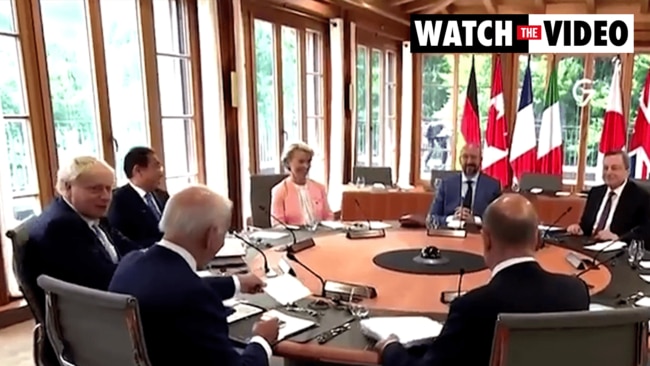
Canada’s prime minister, Justin Trudeau, suggested they wait for the official picture before disrobing but then Johnson quipped “We have to show that we’re tougher than Putin” and the joke kept rolling.
“We’re going to get the bare-chested horseback riding display,” Trudeau said, referring to Putin’s infamous 2009 photo-op of himself riding shirtless on a horse.
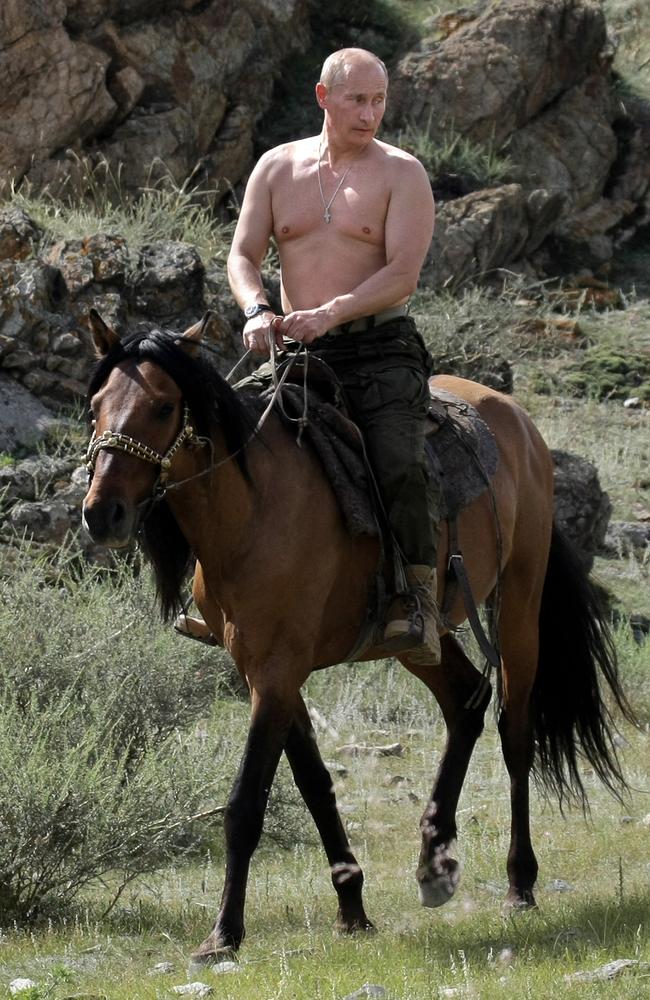
“Horseback riding is the best,” European Commission President Ursula von der Leyen said, without apparently weighing in on the clothing issue itself.
Johnson interjected: “We’ve got to show them our pecs.”
The leaders posed – jackets on – for photos before reporters were hustled out of the room, leaving the sartorial debate behind closed doors.
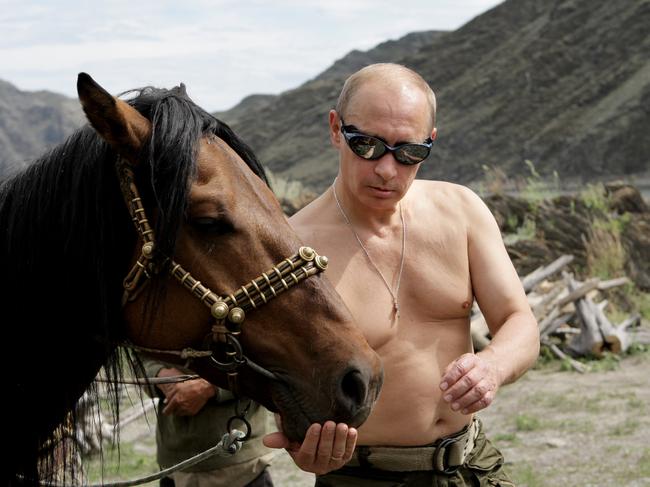
RUSSIA ACCUSED OF DEFAULTING ON DEBT
Russia has been accused of defaulting on its foreign debt for the first time since the 1917 revolution, reports The Guardian.
The country missed a deadline of Sunday night to meet a 30-day grace period on interest payments of $100m on two Eurobonds originally due on 27 May.
The Kremlin insisted on Monday there were “no grounds” to say that Russia had defaulted on its foreign currency sovereign debt as the West pummels Russia with sanctions over its Ukraine offensive.
“There are no grounds to call this situation a default,” Kremlin spokesman Dmitry Peskov told reporters.
Moscow said two of its debt payments had not been transferred to creditors but denied it amounted to a default.
The Russian finance ministry said in a statement that international settlement and clearing systems had “received funds in full in advance” but that the payments were not transferred to the final recipients due to “the actions of third parties”
GIRL, 7, PULLED FROM RUBBLE AFTER KYIV ATTACK
Russian strikes hit a residential building in Kyiv on Sunday, the first attack on the capital in almost three weeks, sparking calls by Ukraine for more support from G7 leaders meeting in Germany.
Four people, including a seven-year-old girl, were taken to hospital following the early morning strikes on a neighbourhood that includes a weapons factory, said city mayor Vitali Klitschko.
Moscow meanwhile said its forces had carried out strikes against three military centres in northern and western Ukraine, including one near the border with Poland.
This 7 y.o. Ukrainian kid was sleeping peacefully in Kyiv until a Russian cruise missile blasted her home. Many more around Ukraine are under strikes. G7 summit must respond with more sanctions on Russia and more heavy arms for Ukraine. Russia’s sick imperialism must be defeated. pic.twitter.com/0kn2hl7A4x
— Dmytro Kuleba (@DmytroKuleba) June 26, 2022
The high-profile attacks, just over four months since Russia invaded its neighbour, come ahead of a week of Western diplomacy focused around the G7 and NATO summits.
Ukrainian President Volodymyr Zelenskyy will address both gatherings, where allies including US President Joe Biden will take stock of their support for Kyiv and of sanctions imposed on Moscow.
Mr Biden on Sunday condemned the attack on Kyiv as “more of their barbarism”, referring to Russia.
The G7 talks opened Sunday with the announcement of a ban on imports of Russian gold, but Ukrainian Foreign Minister Dmytro Kuleba called for more.
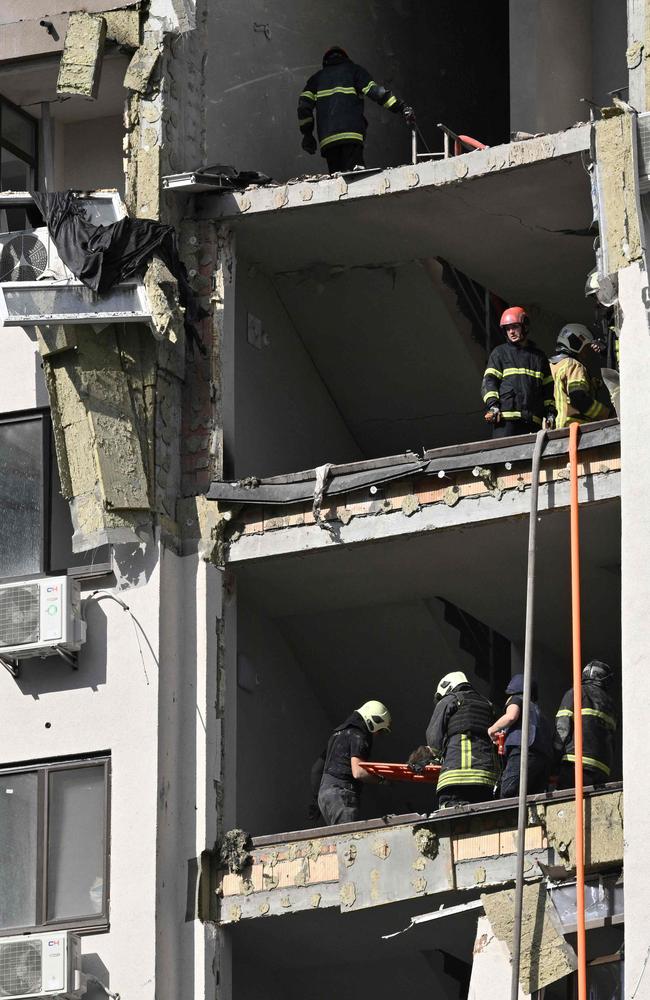
He posted on Twitter a photo of an injured child being carried on a stretcher, who he said was “sleeping peacefully in Kyiv until a Russian cruise missile blasted her home”.
The “G7 summit must respond with more sanctions on Russia and more heavy arms for Ukraine. Russia’s sick imperialism must be defeated”, he said.
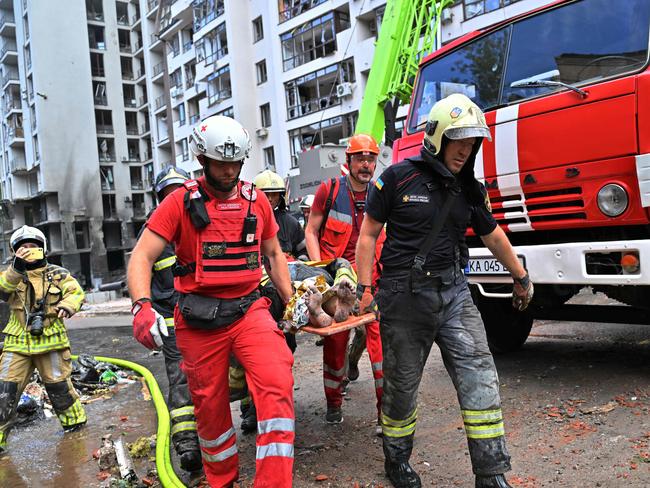
The European Union this past week offered a strong show of support when it granted Ukraine candidate status, although the path to membership is long.
Russian forces sought to encircle Kyiv in the first few weeks after the February 24 invasion, but Sunday’s attack was the first strike on the capital since early June.
Klitschko said the attack was a Russian missile strike intended to “intimidate Ukrainians” ahead of the NATO summit.

It was the third time since the invasion that this northwest neighbourhood had been hit. A weapons factory nearby produces air-to-air and antitank rockets among others.
An AFP team said there was a fire on the top three floors of the building and its stairwell was completely destroyed.
Afterwards, residents gathered at the bottom of the building, many of them in tears. One woman was still wearing a bathrobe.

“I woke up at the first explosion, went to the balcony and saw missiles falling and heard a huge explosion — everything vibrated,” 38-year-old Yuri told AFP, declining to give his surname.
Edward Shkuta, who lives next door, said there had been four missiles since 6.30am.
A building “was directly hit on the top floors and I saw wounded people coming out”.
Russia said on Sunday that its forces had also carried out strikes against three military training centres in northern and western Ukraine, including one near the Polish border, just days before a NATO summit.
The bombings were carried out with “high-precision weapons of Russia’s aerospace forces and Kalibr missiles,” Russian defence ministry spokesman Igor Konashenkov said in a statement.

Among the targets was a military training centre for Ukrainian forces in the Starychi district of the Lviv region, around 30km from the border with NATO member Poland.
The other two training centres were in the central Zhytomyr region and northern Chernihiv region.
After the strikes, several Ukrainian brigades “completely lost their combat capabilities,” Konashenkov said, adding that “plans to deploy them in combat zones were thwarted”.
Russia made a strategic breakthrough Saturday when they took the industrial hub of Severodonetsk, the scene of weeks of fierce battles that have left it largely destroyed.
Severodonetsk’s mayor said it had been “fully occupied” by Russian troops after Ukrainian forces retreated to better defend the neighbouring city of Lysychansk.
Pro-Moscow separatists on Saturday said Russian troops and their allies had entered Lysychansk, which faces Severodonetsk on high ground across the Donets river.
Its capture would give Russia control of the entire Lugansk region in the Donbas, Ukraine’s industrial heartland.

Meanwhile, Ukraine’s national nuclear company, Energoatom, accused Russia of “another act of nuclear terrorism”after missiles were reportedly seen passing over the plant on Sunday.
It comes as a G7 summit opened in Germany on Sunday, and ahead of a NATO meeting in Madrid from June 28 to 30.
At talks on the sidelines of the G7, British Prime Minister Boris Johnson and French President Emmanuel Macron said they saw an “opportunity to turn the tide” in Ukraine, a Downing Street spokesman said.
But Mr Johnson also cautioned Mr Macron — who has maintained a dialogue with Mr Putin, unlike the British leader — that “any attempt to settle the conflict now will only cause enduring instability”.
In Saint Petersburg on Saturday, Mr Putin said Russia would deliver Iskander-M missiles capable of carrying nuclear warheads to Belarus in the coming months, as he received Belarusian leader Alexander Lukashenko.
He also offered to upgrade Belarus’ warplanes to make them capable of carrying nuclear weapons, in comments broadcast on Russian television.
Mr Putin has referred to nuclear weapons several times since the invasion, in what the West has seen as a warning to the West not to intervene.

‘WORST HE HAS SEEN’: WAR VETERAN ON RUSSIAN CONFLICT
Foreign fighters who have joined Ukrainian forces battling Russia’s invasion have been shocked by the brutality of the war and some say that disillusionment is creeping in.
“They fought in Afghanistan or in Iraq and say they aren’t ready” for what they face in Ukraine, says a man who goes by the name of Polak, according to AFP.
Polak estimates there are “several hundred” foreign fighters.
“Sometimes after the first fighting exchanges they will say, ‘we aren’t prepared for that’ and they go home,” says Polak about the mix of nationalities in the Legion — “Canadians, Georgians, Croatians,” he says.
But, they have not been trained to fight in a war involving artillery attack.
“Elon Musk, if you can hear me — we need help!” That was the plea to the billionaire entrepreneur, the world’s richest man, on Friday from a former American GI serving in the northern city of Kharkiv at a press conference.

The reality of what they are up against has been thrown into stark relief with the recent deaths of a Dutchman, a Frenchman, a German and an Australian.
Separatist pro-Russian authorities have also handed down death sentences to two Britons and a Moroccan who have been fighting for Ukraine and have appealed the verdicts.
In early June, Russia reported its forces had killed “hundreds” of foreign combatants in Ukraine.
Legion spokesman, Damien Magrou, 33, from France, concedes that many of the fighters, often hailing from NATO member states, are taken aback by the brutality of the combat theatre.
“An American who has been through six wars told me it was the worst he had seen,” says Magrou.
More Coverage
Originally published as Ukraine crisis: Civilians killed, dozens missing, as Russian missile hits Ukraine shopping mall
Read related topics:Russia & Ukraine Conflict




